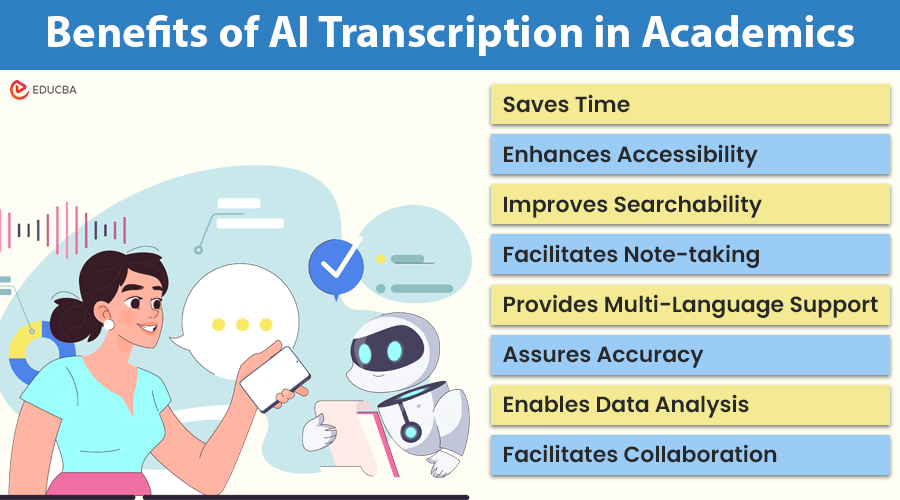
What Does AI Transcription in Academics Mean?
AI transcription in academics refers to using artificial intelligence (AI) technology to transcribe spoken content into written text. This technology can be particularly useful in academic settings, such as transcribing lectures, interviews, research discussions, or even converting recorded conversations into text for analysis.
For example, imagine a professor records a lecture on quantum physics. Instead of typing out every word, which takes time and can lead to mistakes, the professor uploads the recording to a computer program that uses AI. This program listens to the recording and writes down everything the professor says, including all the important details. Then, the professor can review the written version, make any necessary changes, and share it with students. This helps students understand the lecture better because they can read it at their own pace.
Benefits of AI Transcription in Academics
The benefits of AI transcription in academics are:
1. Saves Time
Professors, researchers, and students can save significant time by transcribing lectures, seminars, or interviews using AI. Instead of manually transcribing recordings, they can rely on AI to quickly generate accurate transcriptions.
2. Enhances Accessibility
Transcriptions enhance accessibility for students with hearing impairments or those who prefer reading, making academic content easier to access. AI transcription ensures the content is in text format, making it easier for all students to access and comprehend.
3. Improves Searchability
Transcribed content is easily searchable, allowing students and researchers to locate specific information quickly within a lecture or seminar. This can be particularly useful when revisiting materials for studying or conducting research.
4. Facilitates Effective Note-taking
AI transcription can assist students in taking comprehensive notes during lectures or discussions. Instead of attempting to capture every word, students can concentrate on jotting down key points or summaries, knowing they can refer to the AI-generated transcript for additional details later.
5. Provides Multi-Language Support
AI transcription tools can transcribe content in multiple languages, which benefits international students or academics who may not be fluent in the language of instruction. They can also help translate lectures or discussions into other languages for broader dissemination.
6. Assures Accuracy
While human transcriptionists may introduce errors, AI transcription tools can provide highly accurate transcriptions, especially when trained on specific academic terminology or accents. This ensures that the transcribed content maintains its integrity and reliability.
7. Enables Data Analysis
Transcribed academic content can be easily analyzed using text analysis techniques like sentiment analysis, topic modeling, or keyword extraction. Researchers can extract valuable insights from extensive amounts of transcribed data, which can result in discoveries or a more profound comprehension of academic subjects.
8. Facilitates Collaboration
Transcriptions can facilitate collaboration among students and researchers by providing a shared platform for annotating, commenting, and discussing academic content. This promotes knowledge-sharing and teamwork within academic communities.
9. Allows Review and Reflection
It helps teachers review transcriptions, analyze their teaching methods, identify areas for improvement, and reflect on classroom discussions.
Applications of AI Transcription in Various Academic Areas
Transcripts can be a useful tool for classroom settings for a variety of reasons. Let’s look at a few typical applications for academic transcription:
1. Academic Audio Transcription
- Note-taking Aid: Transcripts of lectures or discussions serve as comprehensive notes for students, helping them review complex material and fill in any gaps in their own notes.
- Revision and Study Tool: Students can use transcripts to strengthen their understanding of course material, clarify concepts, and prepare for exams.
- Accessible Learning: Transcriptions accommodate diverse learning styles and needs, benefiting students who prefer reading over listening or who have disabilities that affect their ability to hear or process spoken language.
2. Academic Interview Transcription
- Research Support: Transcribing interviews conducted for research projects allows students to analyze and interpret qualitative data more effectively, identifying themes, patterns, and insights relevant to their studies.
- Evidence in Assignments: Students may use interview transcripts as evidence in assignments, papers, or presentations to support their arguments or illustrate real-world perspectives.
- Learning by Example: Analyzing transcribed interviews can help students learn interview techniques, communication skills, and qualitative research methods.
3. Academic Research Transcription
- Data Analysis: Transcribing research data, such as focus group discussions or recorded observations, facilitates systematic analysis and coding, enabling students to extract meaningful findings and draw conclusions.
- Documentation for Reports: Students conducting research as part of their coursework or independent projects can use transcripts to document their methods, findings, and interpretations in reports or theses.
- Collaborative Learning: Transcription tasks can be assigned as group projects, fostering collaboration, communication, and critical thinking skills among students as they collaborate to transcribe and analyze data.
Tips for Effective AI Transcription
- Use High-Quality Audio: Ensure clear audio recordings to improve transcription accuracy.
- Proofread Transcriptions: While AI transcription is generally accurate, it’s essential to proofread transcriptions for any errors or inaccuracies.
- Customize Settings: Some AI transcription tools allow customization for specific accents, languages, or technical terms which helps to improve accuracy for specialized content.
Final Thoughts
AI transcription in academics will significantly improve your productivity and efficiency in your academic journey. The advantages are numerous, from faster note-taking and greater research skills to more efficient study sessions and improved organization. Therefore, leveraging modern technologies like AI transcription will be crucial for staying ahead of the trend and achieving your full academic potential as schooling changes.
Recommended Articles
We hope this article on “AI Transcription in Academics” was helpful to you. To learn more, refer to the articles below.

